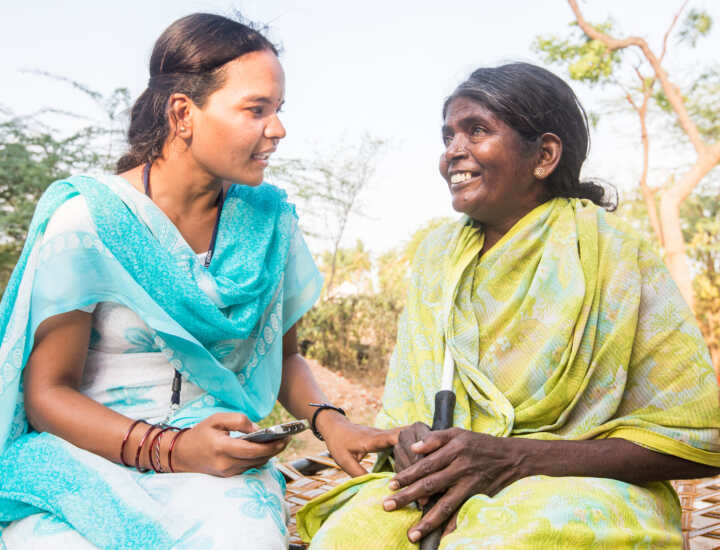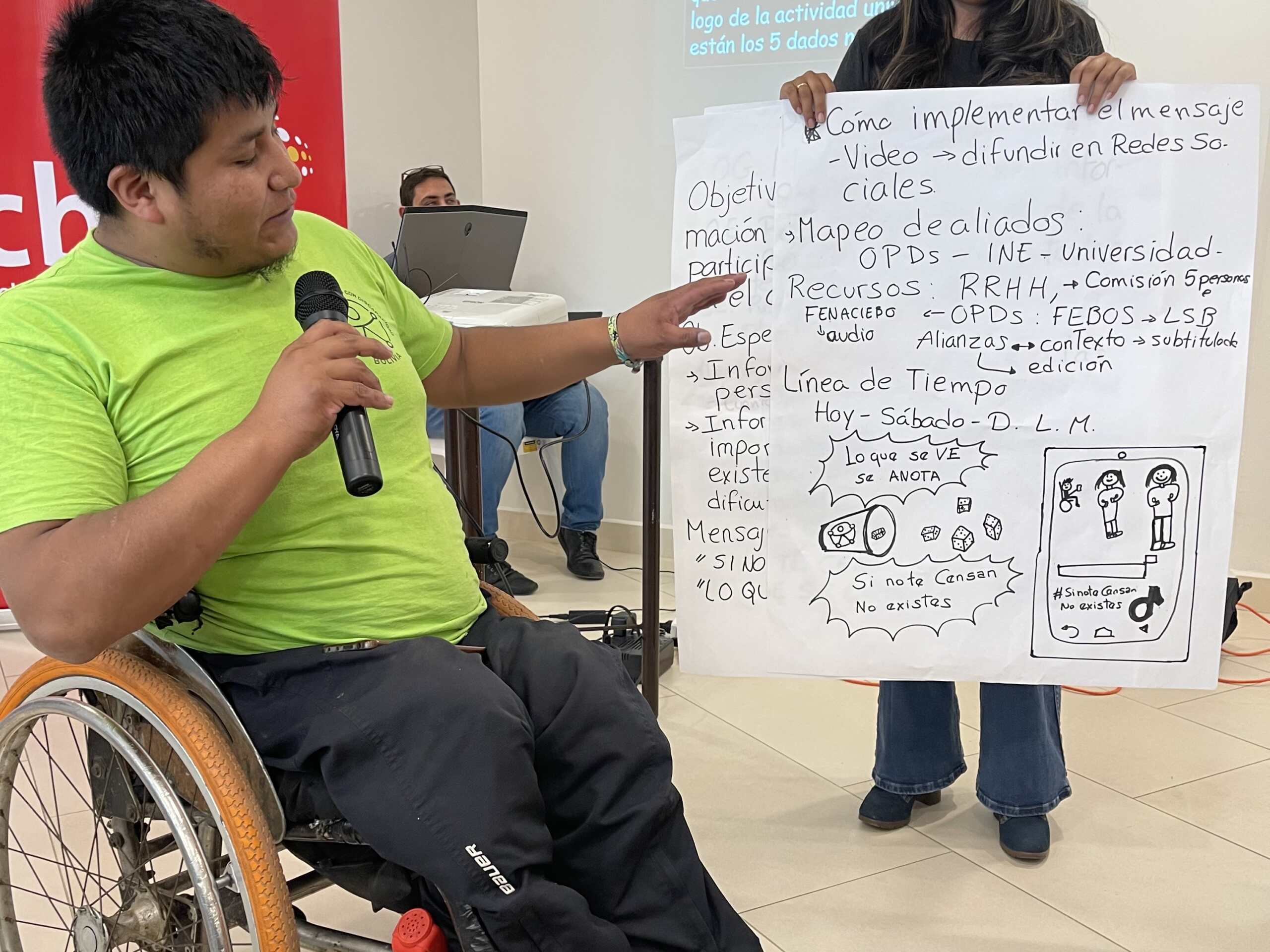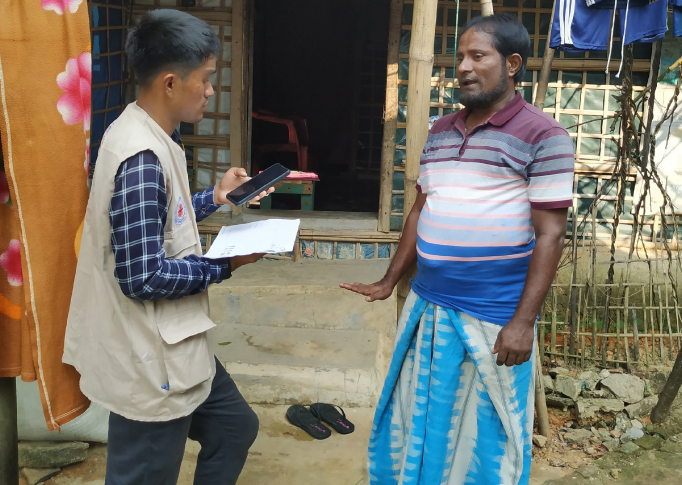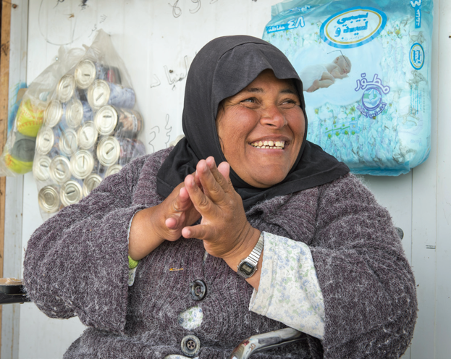Why are we engaged in disability data?
Disability data is needed to understand the real situation of persons with disabilities to identify gaps that are not addressed through policies and to provide examples of success. This is beneficial for evidence-based advocacy and to influence decision makers to address the most urgent actions at national, regional, and global levels. Accordingly, strengthening disability data is one of CBM Global’s advocacy priorities, along with climate adaptation, access to health services, and humanitarian action. Our data advocacy efforts are done in authentic partnership with organisations of persons with disabilities (OPDs) since OPDs must play a meaningful role in the data value chain. Citizen-generated data produced by OPDs, both qualitative and quantitative, can fill data gaps and complement official statistics, particularly in the monitoring of the Sustainable Development Goals (SDGs) and the UN Convention on the Rights of Persons with Disabilities (UNCRPD).

Data partnerships
CBM Global has numerous data partnerships to strengthen disability data
- We co-coordinate the Stakeholder Group of Persons with Disabilities’ disability data advocacy working group with the International Disability Alliance, which includes the interactive disability data list. Click here to join.
- CBM Global and the World Federation of the Deaf have an official partnership, and strengthening data on deaf persons and national sign languages is a key element.
- We are members of the Inclusive Data Charter and the Global Partnership for Sustainable Development Data. Read our Action Plan.
- We have a partnership with UNFPA Asia and the Pacific focused on disability data and data advocacy. This focuses on raising awareness and building capacity on disability data with OPDs, UNFPA and their key partners.
- We are members of the Leave No One Behind Partnership that promotes the generation and use of community-driven data of marginalized groups at risk of being overlooked in the implementation of the SDGs.
- We are members of the Inter-agency and Expert Group on SDG Indicators Task Team on Lessons Learned to identify and document lessons learned from the SDG monitoring framework to inform future development agendas.
- We are on the Strategic Advisory Group of UNICEF’s Centre of Excellence on Data for Children with Disabilities. For more information on CBM Global’s role, read the Centre’s March 2023 newsletter.
- We are engaged in the UN Statistics Division Collaborative on Citizen Data and represented in the steering committee as the Stakeholder Group of Persons with Disabilities.
- We are on the Steering Committee of Fordham University’s Disability Data Initiative.
- We are a founding partner of the iCount Coalition, which is an inclusive data coalition driving data innovations and working to increase visibility and inclusion of marginalized groups in global development data.
- We committed to strengthening the collection, analysis, and use of data on persons with disabilities, including citizen data efforts led by organizations of persons with disabilities in the Fifth UN World Data Forum Commit to Data Campaign in partnership with the International Disability Alliance and the Stakeholder Group of Persons with Disabilities.
- We are members of the UN Women Technical Advisory Group on the Applications of Big Data and Data Science for Gender Data Gaps providing an intersectional data perspective.
Some of our Disability Data Activities
Data Advocacy Workshop in Kenya
This workshop was held on 27 June, 2022 in Nairobi, Kenya and was organised and supported by CBM Global together with United Disabled Persons of Kenya (UDPK) as part of continued dialogues on disability data and building capacities of OPDs and other stakeholders.
OPD-led citizen-generated data collection in the Philippines
CBM Global supported a disability data survey in the Philippines in 2021 and 2022 with OPD partners Las Piñas Persons with Disability Federation, Inc. (LPPWDFI) and Women with Disabilities Leap for Economic and Social Progress (WOWLEAP), who led the citizen-generated data collection.
Data collaborations with the World Federation of the Deaf
Below are joint resources on strengthening data on deaf persons and national sign languages.
- Why is data important for deaf people?
- Barriers to Healthcare Access for Deaf Nigerian Women and Girls during Emergencies
- Pilot Study of Deaf Indigenous Bolivian Women’s Health Experiences (Available in Spanish: Estudio piloto sobre las experiencias de salud de las mujeres indígenas sordas bolivianas)
Watch: In these videos, Sally Nduta and Samuel Kabue share their experience with disability data in Kenya
Our data resources
We have created various tools that can be used to increase disability data awareness.
The International Disability Alliance, the Stakeholder Group of Persons with Disabilities, and CBM Global Disability Inclusion carried out a survey with organizations of persons with disabilities (OPD) and other stakeholders to assess the use and gaps of our Disability Data Advocacy Toolkit.
The survey further explored data gaps and gathered OPD-led citizen-generated data. Two reports emerged from this work: (1) Disability Data Advocacy Toolkit: lessons learned and (2) a compilation of case studies of data generated by organizations of persons with disabilities.
Disability Data Advocacy Toolkit Lessons Learned
A survey was developed and shared with organizations of persons with disabilities to understand how the Disability Data Advocacy Toolkit is being used and how it can be improved as an advocacy resource for organizations of persons with disabilities. The survey was made accessible in multiple languages including Arabic, English, French, Portuguese, Spanish, and a version in International Sign. This report provides the results of this survey and intends to demonstrate the needs of organizations of persons with disabilities in relation to data and their use for advocacy in disability rights.
Citizen-generated Data & Persons with Disabilities
This report features noteworthy examples of projects and initiatives that have successfully gathered data on persons with disabilities and aims to empower advocates and other organizations of persons with disabilities to develop their own regional, national, or international projects to collect data for advocacy purposes.
Disability data advocacy toolkit
The disability data advocacy toolkit was produced by the Stakeholder Group of Persons with Disabilities, the International Disability Alliance, and CBM Global Disability Inclusion. The toolkit highlights the need for data to understand the real situation of persons with disabilities, identify gaps that are not addressed through policies, and provide examples of successes. Additionally, the toolkit illustrates how to analyse, use, and trust data for creating advocacy messages. The toolkit is available in Arabic, Easy Read, English, French, Spanish, and an abridged version in International Sign.
Disability Data Advocacy Workshop for OPDs
The Disability Data Advocacy Workshop for OPDs is a key resource developed under the CBM Global and UNFPA Asia and the Pacific partnership. This resource was developed in collaboration with the Stakeholder Group of Persons with Disabilities, the International Disability Alliance, the Centre for Inclusive Policy and national and regional organisations of persons with disabilities, including the ASEAN Disability Forum and Pacific Disability Forum.
The workshop supports OPDs in their critical role in generating, using and advocating for improved disability data. It introduces the basic concepts and skills on disability data and data advocacy and supports applying these in a local context.
Other resources from the UNFPA partnership
Learning brief on disability data using Washington Group questions
The aim of this learning brief is to consolidate the lessons and experiences of development organisations in collecting and using disability data, with a focus on the question sets developed by the Washington Group on Disability Statistics (WG). The brief focuses on the collection and use of disability data to inform planning, monitoring and evaluation of development programs.
We address common issues and concerns in implementation, as well as suggesting approaches to overcome these issues. We also include case studies from development organisations that have collected and used disability data in their programming and advocacy.



